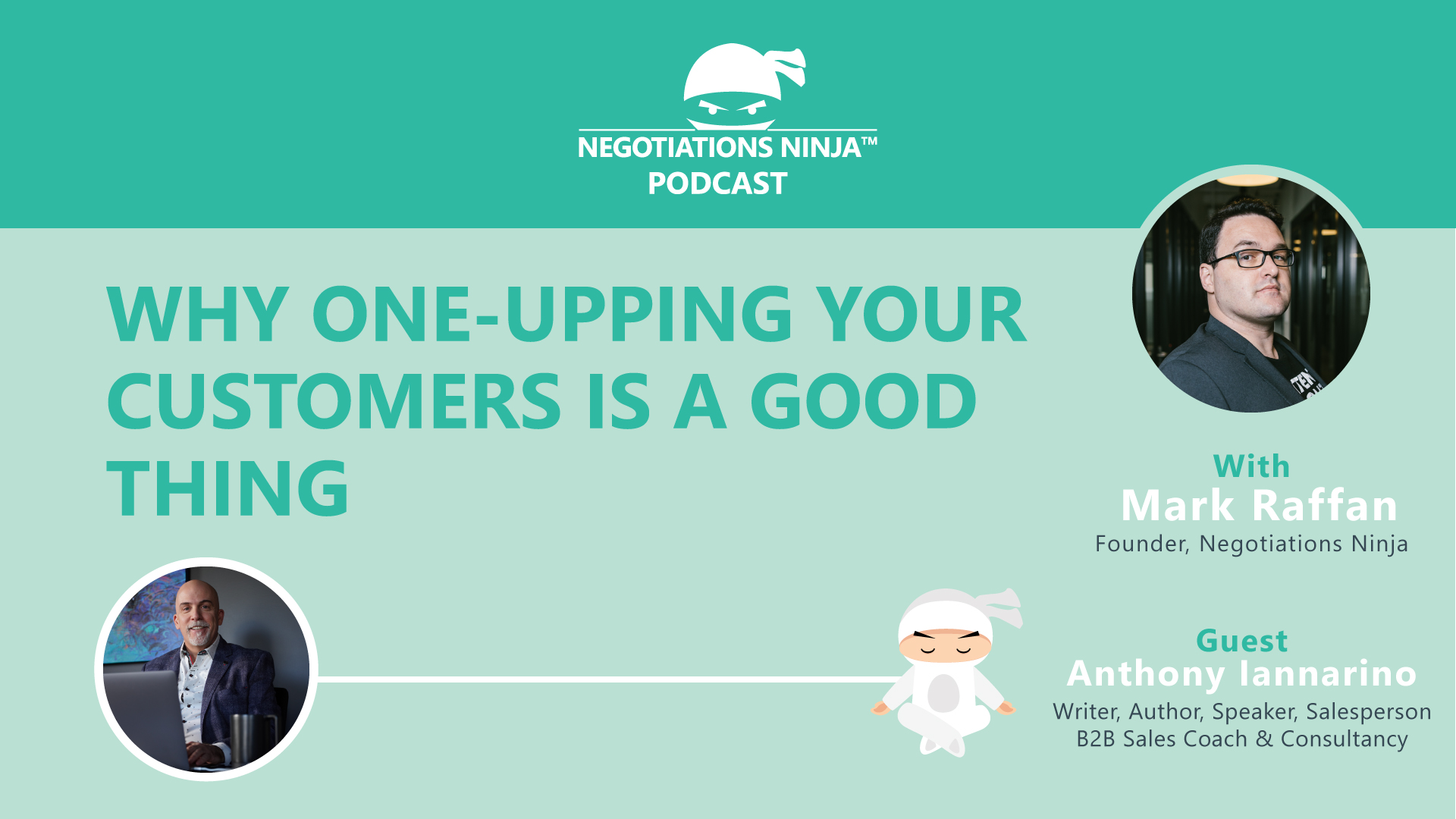You’re supposed to lead and serve your clients—so how is one-upping your customers a good thing? Being one-up is one of the many topics Anthony Iannarino covers in his new book, “Elite Sales Strategies.” It’s not about creating an unfair advantage but instead leading from a position of authority and expertise in your field. Listen to this episode of Negotiations Ninja to hear us discuss Anthony’s unique concept.
Outline of This Episode
- [1:38] Learn more about Anthony Iannarino
- [3:00] The concept of one-upping your Customers
- [6:53] The process of learning what you need to know
- [10:14] The truth at any price is key
- [15:42] Anthony’s triangulation strategy
- [21:48] How to teach someone without offending them
- [26:45] The importance of embracing intellectual humility
- [30:07] Learn more about Anthony’s Outbound Sales Conference
How to be different in the B2B sales space
In B2B, it’s not all about getting the sales—it’s also about serving your customers. That’s why many traditionally trained salespeople struggle in B2B. But the only thing that you ever have is the sales conversation. You think you have a product and service. But they will only create value if the sales conversation is successful.
Your job is to help the client understand the forces and factors they need to think about as they make decisions. What would the best decision look like? Why would they choose one thing over another? They’re trying to make a decision that will get them better results in the future. If you don’t serve them and don’t understand that your role is to create value, they’ll find someone else to buy from.
If you’re giving someone insight, teaching them how to make a decision, and helping them understand what they need to know, you’re differentiating yourself.
The process of one-upping your customers
We all know what it means to “one-up” someone, right? It’s about gaining an advantage over another person. Anthony’s definition of one-upping someone means, “I know something that you don’t know.” But it’s not about gaining the upper hand because the next step is, “May I share it with you?” This puts your customer or client in the one-up position. How?
If you sell ERP, a customer might look at a new system every 10–15 years. In between, they have no idea what’s changed in the industry. They’re working from a set of false assumptions, i.e., “one down.” You guide people to better results every single day. You know more than they do.
But you’re also one-down because you don’t know everything. Your client is one-up when it comes to their goals, how they’ll do something, what the right answer is, what help they’ll need, etc. They know more about their business than you do.
As a salesperson, I can teach you how to make an informed decision because I do it every day. When I ask to understand what’s going on in your world, I become educated. But you have to be humble enough to say, “I’m going to be one-down and learn what I need to know to be successful in this process that we call the sales conversation.”
One-upping is a constant exchange of information where both parties learn and become better informed throughout the sales conversation. The goal, through your product or service, is for your customer to realize value and be in the one-up position. But how do you get to that point?
The process of learning what you need to know
You want to understand why they think they have a particular problem and what they know and don’t know. Anthony has a giant list of questions that he goes to (and these just scratch the surface):
- What’s changed in your environment that would cause you to do something different now?
- Who needs to be in the room? What do they care about?
- What is the right solution going to look like?
- What problems will need to be overcome to make behavioral changes?
Anthony will have several conversations about how the process works. But he also tells his customers what they need to do based on his experience.
Anthony was climbing Mount Everest with a Sherpa (someone who lives in the Himalayas). His Sherpa told him he didn’t have altitude sickness but was allergic to the altitude sickness medication his doctor prescribed. His Sherpa doesn’t have a high school diploma or advanced medical degree, but he’s seen it all. His experience allowed him to build pattern recognition. He was one-up on Anthony. So Anthony threw the medicine away.
The Sherpa then told him that he walked too slowly and needed more oxygen in his lungs. When you’re in the Himalayas, you have to breathe differently than when you’re at sea level. So Anthony walked faster, took in more oxygen, and felt perfectly fine 10 minutes later.
You will always know something someone else doesn’t and vice versa. If you sell, you have a sense that you have to ask questions. Once you see a pattern in your conversations, you begin to know what you need to ask.
Resources & People Mentioned
Connect with Anthony Iannarino
- Elite Sales Strategies
- The Only Sales Guide You’ll Ever Need
- Connect on LinkedIn
- Follow on Twitter
Connect With Mark
- Follow Negotiations Ninja on Twitter: @NegotiationPod
- Connect with Mark on LinkedIn
- Follow Negotiations Ninja on LinkedIn
- Connect on Instagram: @NegotiationPod




